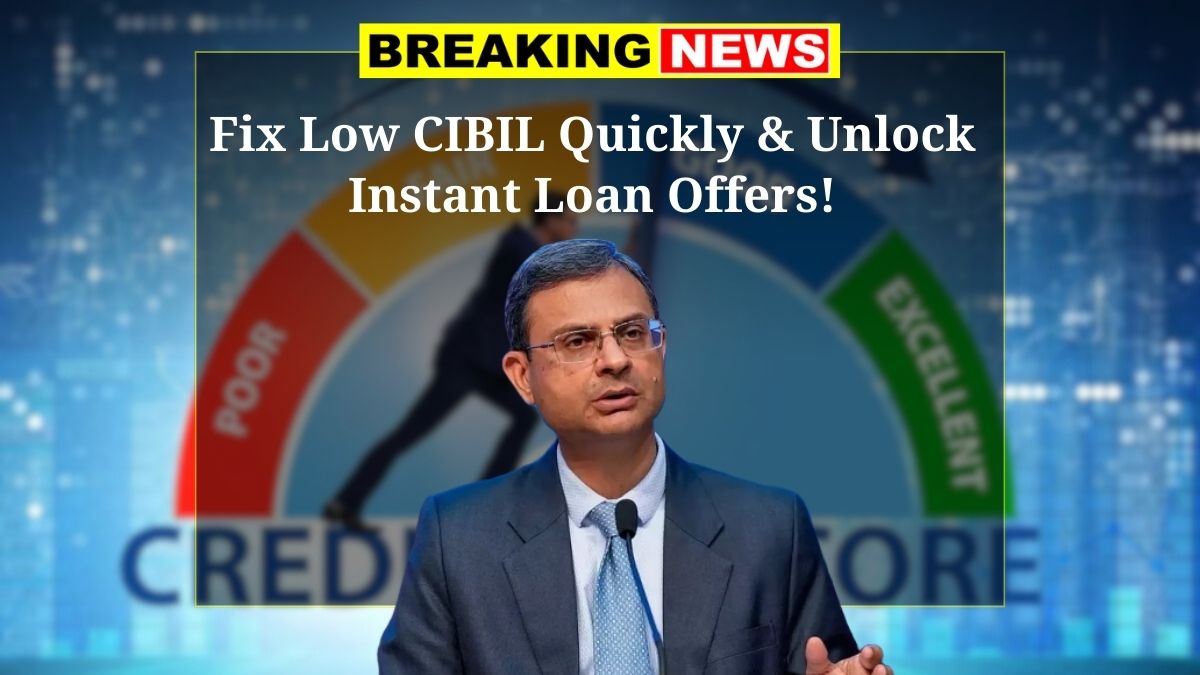CIBIL Score – If you’ve ever applied for a loan or a credit card and faced rejection, chances are your CIBIL score had something to do with it. Many people don’t even realize how much this three-digit number can affect their financial life until it’s too late. But don’t worry. A low CIBIL score isn’t the end of the road. In fact, with a few smart moves and consistent habits, you can rebuild your score and open doors to instant loan approval.
Let’s break it down in simple words so you know exactly what to do and how soon you can expect results.
What is a CIBIL Score and Why It Matters
Your CIBIL score is basically a number between 300 and 900 that shows how trustworthy you are when it comes to paying back borrowed money. Banks and lenders check this score before approving any loan. A high score means you’ve been good with your repayments, while a low score means you’ve missed payments or borrowed more than you could handle.
Here’s a quick idea of how your score is seen by lenders:
- Above 750: Excellent and most likely to get quick loan approval
- 700 to 749: Good and likely to get approved, sometimes at slightly higher interest
- 650 to 699: Fair but you may face strict terms
- 550 to 649: Poor, tough to get a loan without high interest
- Below 550: Very poor and loan approval is unlikely unless you provide collateral
How a Low Score Affects You
When your score is low, lenders see you as a risk. That means:
- Higher interest rates
- Lower loan amounts even if approved
- Chances of rejection from top banks
- You may need to give security or bring a guarantor
- Only a few lenders may be willing to consider your application
Why Your CIBIL Score Is Low
Your credit score drops when:
- You miss or delay EMIs or credit card payments
- You use too much of your credit limit
- You apply for too many loans in a short time
- You only have unsecured loans like personal loans or credit cards
- You don’t have a credit history or your report has errors
What Mistakes You Should Avoid
Here are some common mistakes that hurt your score and how to fix them:
- Late EMI payments – Always pay on time, use auto-pay if needed
- Using your entire credit card limit – Keep it below 30 percent
- Applying for many loans at once – Only apply when necessary
- Closing old credit accounts – Keep them active, they help your history
- Ignoring your credit report – Check it at least twice a year and fix any mistakes
Fast Ways to Improve Your Score
Here’s what you can start doing today to boost your credit score:
- Pay on Time – This is the number one rule. Never delay even by a day. Set reminders or auto-debits to stay on track.
- Keep Your Credit Usage Low – Try to use only 20 to 30 percent of your total card limit. Paying off balances early in the month helps.
- Don’t Take Too Many Loans Together – If you have existing loans, try to close them before applying for new ones.
- Have a Mix of Credit Types – Try to maintain both secured (like home or car loans) and unsecured credit. It shows responsible usage.
- Check Your Credit Report Regularly – Get your free credit report once a year and report any errors or wrong entries.
Loan Options When Your Score Is Low
Even with a bad score, you’re not totally out of options. Here are some loan types you can explore:
- Secured Personal Loans – You offer something like gold or property as security
- Gold Loans – Easy to get and based on the value of the gold
- Loan Against FD – If you have a fixed deposit, banks offer loans on that
- NBFC Loans – These are from non-banking finance companies and are more flexible than regular banks
- Peer-to-Peer Lending – Borrow directly from people on online platforms
- Payday Loans or Small Personal Loans – These are quick but usually have high interest
How Long Will It Take to Improve Your Score
Improvement depends on where you start and how serious you are:
- If your score is between 650 and 700, you can see a difference in 3 to 6 months
- If it’s between 550 and 649, expect 6 to 12 months of disciplined effort
- If it’s below 550, you’ll need at least a year or more to fully bounce back
Remember, building a score takes time, but it’s worth every bit of the effort.
Smart Habits to Keep Your Score High
Once your score is up, make sure it stays there. Here’s how:
- Always pay your bills and EMIs on time
- Use only what you need on your credit card
- Avoid applying for too many loans back-to-back
- Keep old accounts with good history open
- Check your credit report at least twice a year
- Don’t borrow more than you can repay
Having a low CIBIL score can feel frustrating, especially when you need urgent funds. But the good news is that it’s not permanent. With smart financial behavior and patience, you can rebuild your credit and gain access to better financial products.
Start by making your payments on time, lowering your credit use, and watching your credit report closely. If needed, choose loans that are available even with a poor score but repay them responsibly. In a few months, you’ll start to see progress and build a solid financial profile that lenders will trust.





